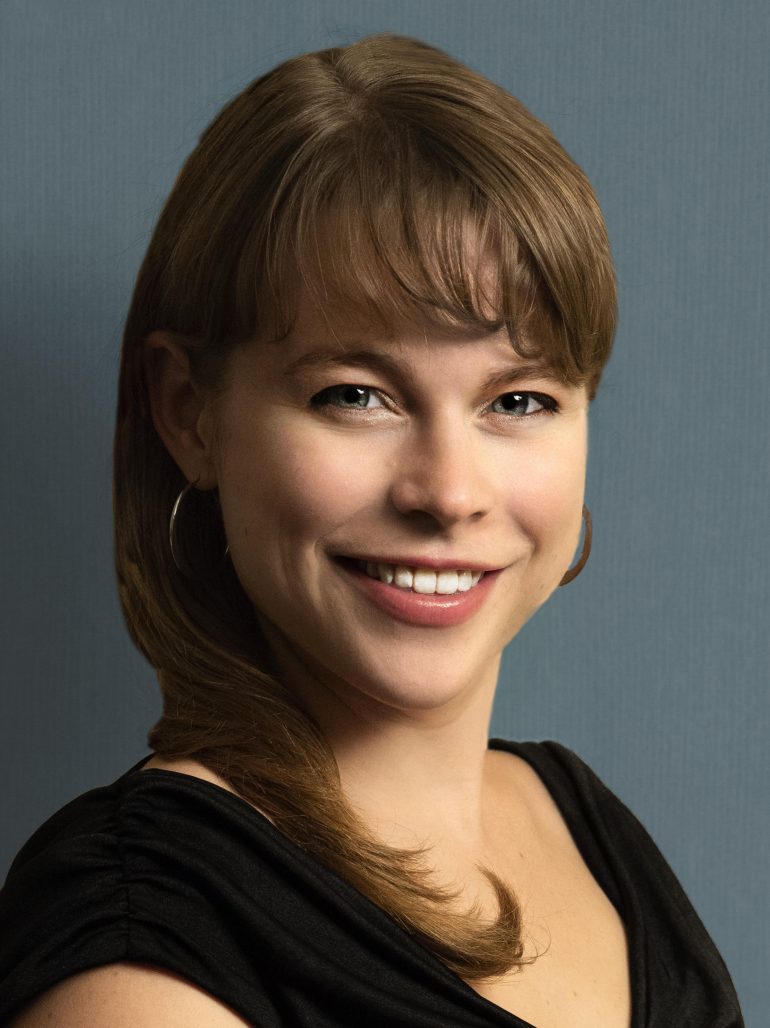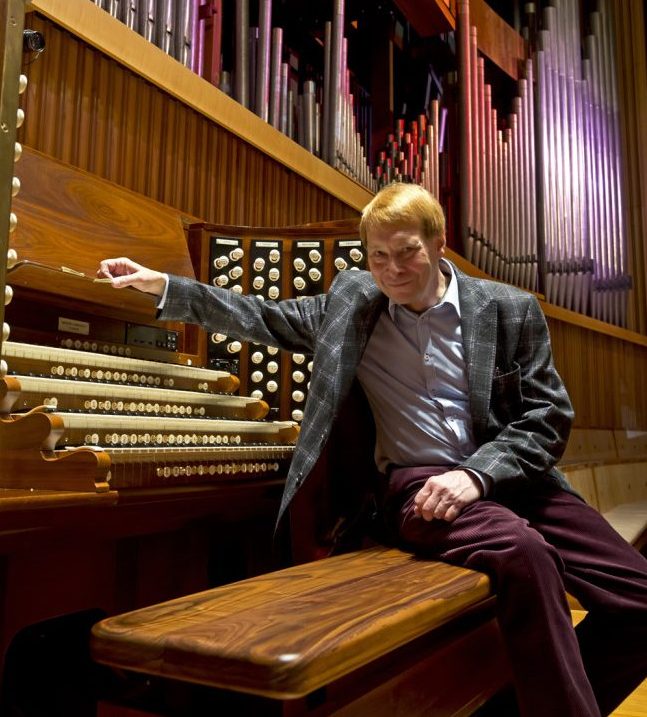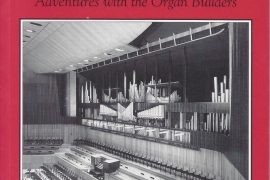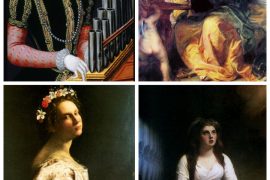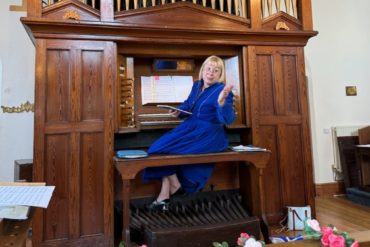Concert organist Katelyn Emerson found time to talk about her current and future musical plans in advance of the AGO Seattle Convention.
Lockdown had a few silver linings: as part of the Royal College of Organists’ Winter Conference earlier this year we in the UK could enjoy a sparkling online recital from the US by Katelyn Emerson on the 1863 Walcker organ at Methuen Hall in Massachusetts. I’m looking forward to her recitals and workshops when I attend the AGO National Convention in Seattle this July, especially her insights into playing ergonomics (see below). Wonderful that she can say that her days of travelling and performing live are flooding back, and that she found time in her increasingly busy schedule to give me these engaging answers to my Five Questions interview. (OK, I know I sneaked in a sixth question about surviving during the pandemic, but that’s something still weighing on many musicians’ minds.)
Which piece of music are you studying at the moment and why?
I’m usually happiest with a variety of repertoire on my music desk, which is useful since I will perform on drastically different instruments over the next few weeks and months. Of course, a 1991 Quoirin/Loriaut with a particularly Italian accent calls for different music than a 2002 Reuter or a 1911 Lewis, and a 1979 Brombaugh will not be shown off as successfully if I play music selected with a 2021 Dobson, an 1863 Walcker (even one changed from the original), or a 1992 Klais in mind! So, music by Sweelinck, Muffat, Boëly, Reincken, Lübeck, Mendelssohn, Coleridge-Taylor, Bairstow, Distler, Duruflé, Tournemire, Vierne, Franck, Price, Alcock, Koehne, Dahl, and Laurin is making my music bag nearly too heavy to be accepted onto the next flight, but a small but significant project at the forefront of my mind is in honour of a dear friend and colleague who passed away on Tuesday of Holy Week, only a few weeks ago as I write this. Prior to his very recent cancer diagnosis and sudden passing, he had begun to learn the Cinq Improvisations of Charles Tournemire as transcribed by Maurice Duruflé. He was particularly excited to learn the Cantilène improvisée and Petit rapsodie improvisée which, although the shortest, may be the most charming of the five. The other three Improvisations are already part of my repertoire, so I am now learning his favourites of the set, the Cantilène and Rapsodie, in his honour.
What has been your best experience as an organist?
The most thrilling extraverted moments are those spent filling a vast concert hall with sound while feeling energy from an audience that is along for a musical ride, and the most heart-warming ones are when I can meet and then stay in touch with friends around the world, but perhaps the moments that my introverted self most treasures are those when I have ancient spaces to myself, when I can peek behind the curtain of history and walk in the footsteps of those who passed on long ago. The quietness of concert halls, cathedrals, and parish churches, old and new, transmits the significance felt by those who built them, worshipped in them, and celebrated joy- and sorrow-filled moments beneath their ceilings, allowing even a nomadic musician to participate in a long line of social and cultural history held by these silent witnesses. We organists have the extraordinary privilege to enter such spaces, get to know them just a little, fill them with sound, and share our stories alongside theirs.
What has been your worst experience as an organist?
That’s rather difficult to say, whether because I usually find the benefits of a musical or logistical challenge or because I’ve blocked bad experiences from my memory! However, what comes most to mind ties into the next question: the pandemic. Suddenly, in March 2020, all travels, all visits to new instruments, all planned time with friends around the world, and all concerts were cancelled, with no clarity as to when they might be rescheduled – if at all. I had regular dreams of boarding airplanes to go to new places and meet new instruments! The shock that such a thing could even happen hit us all differently, I think, particularly since we have been incredibly spoiled with the world seeming so small and travel so easy in recent years. The idea that travelling, something that was part of weekly if not daily life for many of us, could vanish so effortlessly was a reminder of how much we take for granted.
What did you do during the pandemic? How did you survive, musically?
When lockdowns started in March/April 2020, I had just returned to Europe from a concert tour in the USA. I was living in Tuttlingen, a town in southwest Germany halfway between Zurich and Stuttgart, finishing up my MA in organ with Ludger Lohmann at Stuttgart’s Hochschule für Musik und Darstellende Kunst. This meant I was quite fortunate through the start of the pandemic: this was my final semester, with no requirements besides my Abschlussprüfung, my final concert, which took place in late June. The pandemic allowed me to challenge myself to learn repertoire I may not have otherwise had time to study given the number of concerts and amount of traveling I had scheduled that spring. It also gave my husband and me time to explore our beautiful little corner of Germany with the Bodensee, the Danube, and the Schwäbischer Alb all within a 20-minute drive. When we moved back to the USA in September of that year, I expanded my repertoire even further and also pursued a pedagogical interest I have had for some time: ergonomically-informed playing technique for both injury prevention and injury recovery. I received a certificate in Occupational Ergonomics through Colorado State University, published a series of videos on practice techniques, including healthier, ergonomically-centred ones, and expanded my private teaching studio to the extent that half of my organ students are currently focusing on this kind of study in addition to interpretation. The other realm of research into which I delved more deeply regards the practical and cognitive intersections between language and music, an interdisciplinary field that has made great gains in the last twenty years or so – and another for which a lifetime of study would never be enough! Concerts, both pre-recorded and live, trickled back and have now become a wonderful flood, making this spring and summer more music-filled than I could have dreamt.
What’s the best piece of advice you were given by an organ teacher? (and who was it?)
While at least twenty examples of excellent musical, career, and practice advice given by a half-dozen different teachers spring to mind, I think the broadest and most useful piece of advice I have been given was from a dear colleague, Mark Dwyer, organist & choirmaster of the Church of the Advent in Boston. “Never let the piston get in the way of the music.” This simple, common-sense concept is nonetheless so often not followed in organ music, since the complex “machine” of the instrument itself can too easily interfere with the making of music. Whether this is because one pipe or another speaks slower, because one note isn’t working or doesn’t exist because of keyboard or pedal compasses, because the fingering must be different, all the pistons are in different places, a wrong note happens, or a myriad of other reasons why playing today feels nothing like playing yesterday, we have the weighty responsibility to always ensure the music is the first priority. A missed piston never distracts as much as a missed or accidentally-delayed beat, something that is easy for any of us to forget! Mark’s advice, on both the micro- and macro-levels, cuts to the heart of what could likely sum up my – and probably most musicians’ – playing philosophy, said best by the French poet Paul Verlaine: de la musique avant toute chose.
What would be your own best piece of advice for student organists?
Whether a student of any age is pursuing music either as the primary focus of their career or alongside other pursuits, I encourage deliberately cultivating one of the most essential parts of both living and music-making: creativity.
Ironically, the more we learn about a profession, especially one within the creative arts, the more we can be tempted to limit our own movement within it, restraining our possible career paths to perhaps 2-3 of the most frequent examples and seeing one of those as the foregone career conclusion, and the sole definition of success. I try to encourage my students to see not only the musical and professional things on which they can improve (which so many of us can be blinded by in the practice room!), but also to continue to discover and hone their strengths, assessing and reassessing how to combine these into their opportunities and their career options as they develop as musicians and as individuals.
Many of the most successful musical careers are those of musicians who continue to think outside the box, taking thoughtful advantage of opportunities as they arise and refusing to be defined by just one professional avenue. On and off social media, within and without the church or concert hall, and through marketing and managing their music-making and networking, organists throughout the world are finding and creating unique opportunities that suit their particular abilities. The organ world needs the variety of skills and the imagination of unique and thoughtful individuals, which every student I have ever met has the capacity to be. It is a joy to watch careers develop in ways I never dreamt possible, and I can’t wait to continue learning from the creative work going on around all of us!
Katelyn’s website Katelyn Emerson concert organist details her impressive biography as organist, lecturer and pedagogue, and lists her forthcoming performances, including her events at the AGO National Convention in Seattle.

